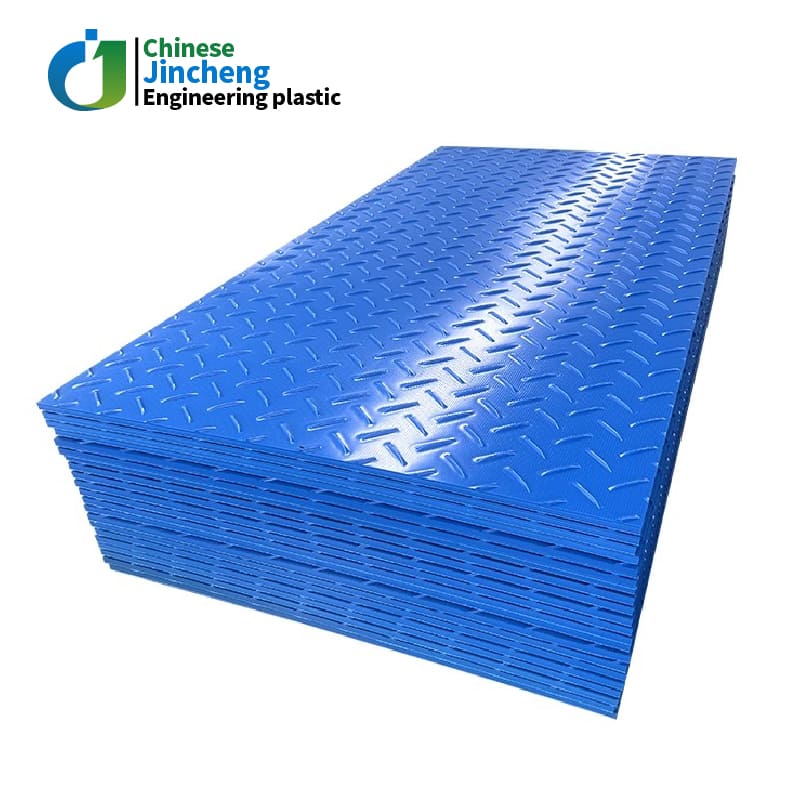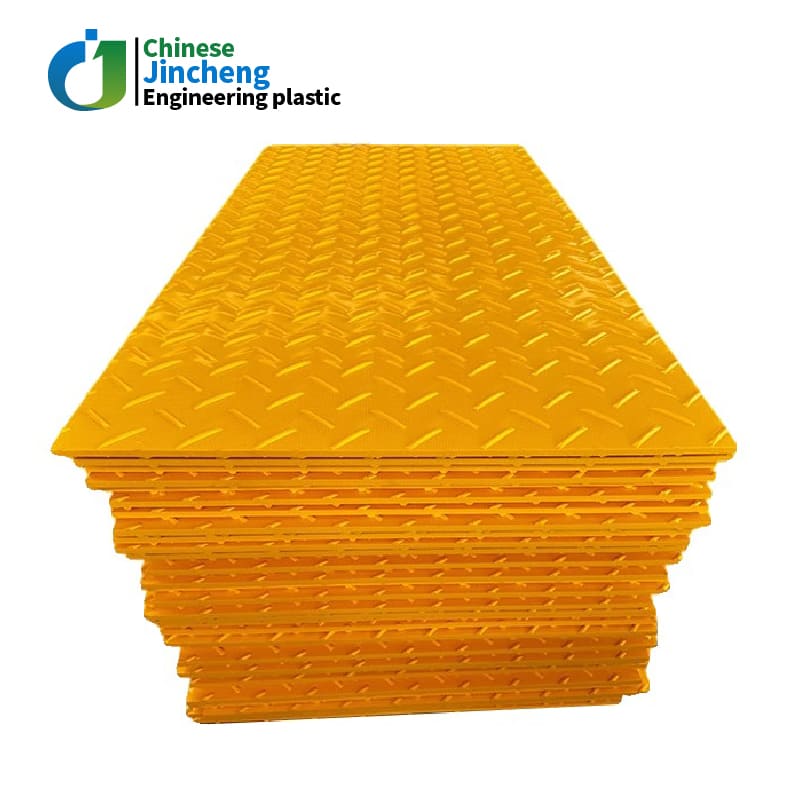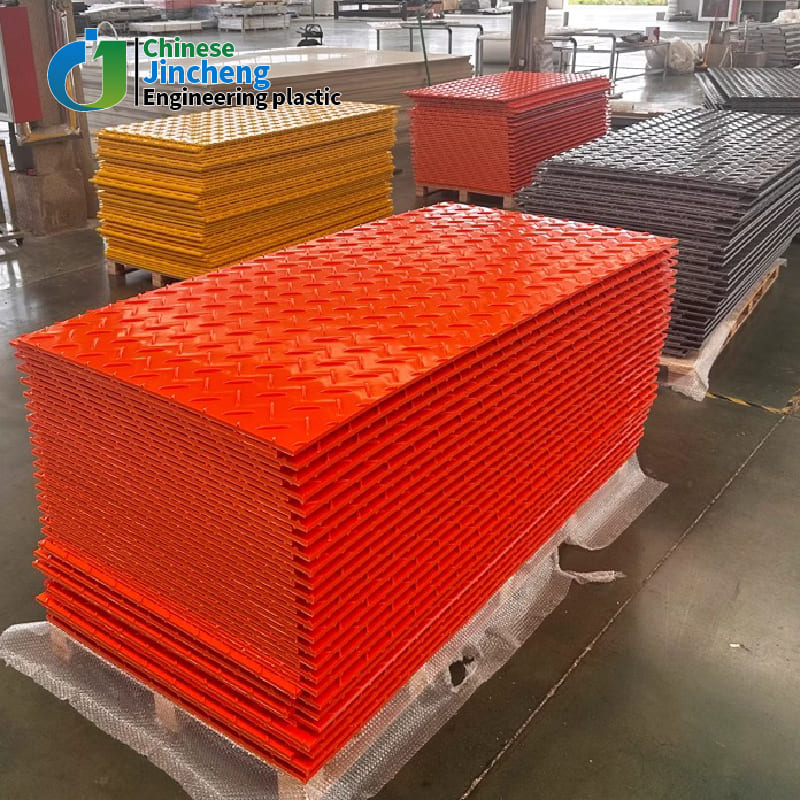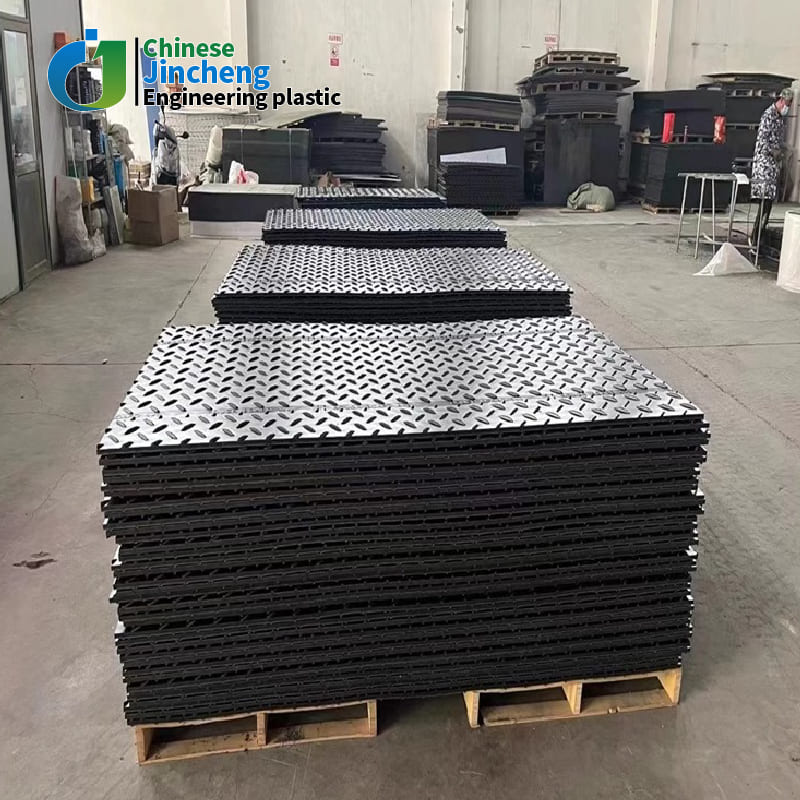What is a temporary pressure resistant paving board
Temporary pressure resistant paving board is a type of board used for temporary road paving. It is usually made of high-strength materials such as polyethylene (PE), polypropylene (PP), or composite materials, which can withstand significant pressure in a short period of time and provide temporary access roads for vehicles and pedestrians.

Advantages of temporary pressure resistant paving board
High pressure resistance. Temporary pressure resistant paving boards can withstand the weight of various vehicles, including heavy-duty trucks, excavators, and other construction machinery. Its pressure resistance depends on the strength of the material and the thickness of the board.
Good anti slip performance. The surface is designed with anti slip textures to prevent vehicles and pedestrians from slipping while walking or driving on it. The anti slip texture can be raised granular or striped, increasing the friction between the sole or tire and the surface of the board.

Limitations of temporary pressure resistant paving board
Difficulty in repairing after wear and damage. Once the paving board is worn, cracked, or otherwise damaged, it can be difficult to repair. Especially for some cases of internal structural damage, it is difficult to effectively repair and usually only replacement can be carried out.
Concentrated load problem. When the load is concentrated on a small area, even if the total weight does not exceed the specified bearing capacity, it may still cause damage to the paving slab.
The main function of temporary pressure resistant paving board
Carrying transportation functions.Temporary pressure resistant paving boards can withstand the weight of vehicles and provide temporary driving surfaces for heavy trucks, loaders, and transportation vehicles on construction sites, as well as outdoor large-scale activity venues. At the same time, it also provides safe walking paths for pedestrians to prevent slipping or twisting on rough ground.
The working principle of temporary pressure resistant paving board
The temporary pressure resistant paving board disperses pressure through the elasticity and toughness of the material and structural design, and achieves anti slip by relying on surface texture and material roughness. Its flexibility can fit different ground surfaces, and the connecting structure ensures stability when adapting to the ground, providing temporary access roads for vehicles and pedestrians.


There are various types of temporary pressure resistant paving board , how to choose the one that suits you
一、Evaluate the ease of installation and disassembly
1.Whether the installation method is simple or not. In some emergency situations or situations where temporary passages need to be quickly built, such as natural disaster rescue sites, it is crucial to choose paving slabs with simple installation methods. Some paving boards have simple splicing structures such as slots and blocks, which can be quickly spliced together without the need for complex tools, greatly improving installation efficiency.
2.Storage and transportation convenience after disassembly. After use, the paving board needs to be disassembled for storage and transportation. Consider factors such as the weight, size, and ease of stacking of paving slabs. Lightweight, regularly sized, and easy to stack paving boards are more convenient to store and transport after disassembly, saving space and transportation costs.
二、Consider anti slip and surface characteristics
1.Degree of anti slip requirements. Different usage scenarios have different requirements for anti slip performance. In places where vehicles are traveling at high speeds or pedestrians are prone to slipping, such as slopes or humid environments, it is necessary to choose paving slabs with good anti slip performance. You can check the texture on the surface of the paving board, and granular texture usually has better anti slip effect than striped texture.
2.Surface smoothness and comfort. For places that require frequent human walking, such as activity areas, temporary passages, etc., the smoothness and comfort of the paving board surface should be considered. A surface that is too rough may make walking uncomfortable, while a surface that is too smooth is prone to slipping. Choosing a paving board with a moderate and smooth surface texture can provide a better walking experience.
三、Choose according to the usage environment
1.Environmental temperature factor. If used in high-temperature environments, such as engineering construction in desert areas, high-temperature resistant materials should be selected. Some special thermoplastic materials can maintain good performance at high temperatures and will not soften or deform due to excessive temperature. On the contrary, in cold regions, the toughness of materials at low temperatures should be considered to avoid brittle fracture of paving slabs.
2.Chemical environmental impact. If there are chemical substances around the usage scenario, such as chemical enterprises, sewage treatment plants, etc., it is necessary to choose paving boards that are resistant to chemical corrosion. For example, polypropylene paving boards have good resistance to many common chemicals and can be used normally in environments with acidic and alkaline chemicals, preventing the paving boards from being corroded and damaged.
四、Consider carrying capacity requirements
1.Estimated load-bearing capacity. Firstly, it is necessary to clarify the maximum load-bearing capacity in the usage scenario. If it is used for construction sites, the weight of heavy machinery such as concrete mixer trucks and cranes needs to be considered. Generally speaking, the weight of a small loader may be around 5-10 tons, while a large concrete mixer truck can reach 30-40 tons when fully loaded. Select paving slabs that can withstand the corresponding weight based on the weight of these vehicles.
2.Pay attention to the concentrated load situation. In addition to the total weight, consider whether there will be a concentrated load. Branches of cranes and sharp support points of large equipment can generate concentrated pressure. For situations where concentrated loads may occur, it is necessary to choose paving slabs that can withstand local high pressure.